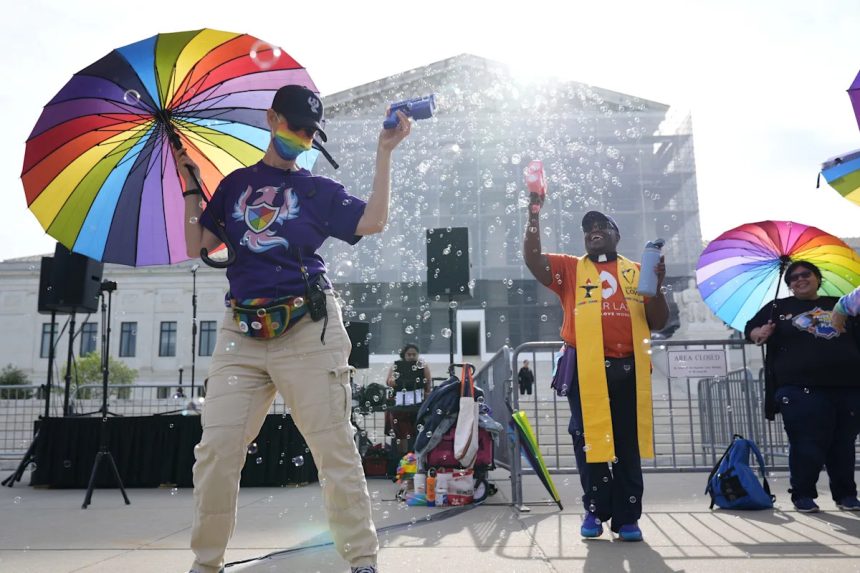WASHINGTON – The Supreme Court on Oct. 7 will debate whether Colorado’s ban on “conversion therapy” for gay or transgender minors violates the free speech rights of a licensed counselor.
The counselor, who has the support of the Trump administration, says she’s engaging in voluntary “conversations” with clients and there’s no evidence that her approach is harmful.
Colorado argues that states have long had the ability to protect patients by regulating health care professionals. State officials also say the evidence shows trying to change someone’s sexual orientation or gender identity doesn’t work and can lead to depression, anxiety, loss of faith and suicidality.
Here’s what you need to know about one of the most high-profile cases the court will consider this term.
More: The future of LGBTQ+ conversion therapy may depend on this Supreme Court case. What to know
What does Colorado’s law say?
Enacted in 2019, Colorado’s Minor Conversion Therapy Law prohibits licensed mental health workers from providing conversion therapy to minors.
The state defines conversion therapy as attempts to “change an individual’s sexual orientation or gender identity, including efforts to change behaviors or gender expressions or to eliminate or reduce sexual or romantic attraction or feelings toward individuals of the same sex.”
The law does allow counseling that helps a minor with “coping, social support, and identity exploration and development.”
“The only thing that the law prohibits therapists from doing is performing a treatment that seeks the predetermined outcome of changing a minor’s sexual orientation or gender identity because that treatment is unsafe and ineffective,” the state’s lawyers told the Supreme Court in their written response to the challenge.
Does the law cover religious counselors?
Colorado exempts anyone “engaged in the practice of religious ministry” who is not a licensed mental health professional.
Demonstrators rally outside of the Supreme Court on April 22, 2025 as the court hears arguments in a case to determine whether a Maryland school district’s reading program, which includes titles featuring LGBTQ+ characters and themes of inclusion, has unconstitutionally infringed on parents’ rights to freely exercise their religion under the First Amendment.
Who is challenging the ban?
Kaley Chiles, a licensed counselor who said she practices from a Christian perspective, argues the law interferes with her ability to help clients “to live a life consistent with their faith.”
She said the law allows her to support an adolescent who wants to transition to another gender but not to help a young person to accept their assigned sex at birth.
“Clients would like to hear a message of hope that you can have struggles with your body in a variety of ways and you can actually grow in peace and comfort with the body that you’re in,” Chiles told USA TODAY.
She is represented by Alliance Defending Freedom, a conservative legal organization that has appeared frequently at the court in recent years in cases involving some of the most controversial social issues.

Colorado licensed counselor Kaley Chiles is challenging the state’s ban on “conversion therapy” for minors.
What is the Trump administration’s position?
Although the case is about a state – not federal – law, the Justice Department has gotten involved. At the department’s request, the government’s lawyers will get time during oral arguments to support the counselor’s challenge. They’ve already told the justices that Colorado is “muzzling one side of an ongoing debate in the mental-health community about how to discuss questions of gender and sexuality with children.”

President Donald Trump gestures, as he signs an executive order banning transgender girls and women from participating in women’s sports, in the East Room at the White House in Washington, U.S., Feb. 5, 2025.
What has the mental health community said?
More than a dozen mental health and medical professional organizations – including the American Psychological Association and the American Psychiatric Association – say efforts to change someone’s sexual orientation, gender identity, or gender expression “do not meet the criteria of a legitimate therapeutic treatment.”
In a brief supporting Colorado’s ban, the groups said such efforts are “potentially harmful, discredited practices, and are not supported by credible scientific evidence.”
What did the lower courts decide?
A U.S. District court in Colorado dismissed Chiles’ challenge in 2022. The U.S. Court of Appeals for the 10th Circuit upheld that decision last year.
“The (law) does not regulate expression,” Judge Veronica Rossman wrote for the appeals court, which split 2-1. “It is the practice of conversion therapy – not the discussion of the subject by the mental health provider – that is a `prohibited activity’ under the (law).”
In his dissent, Judge Harris Hartz called the majority’s conclusion “wordplay” that “poses a serious threat to free speech.”

Colorado Attorney General Phil Weiser speaks to reporters outside the U.S. Supreme Court on Dec. 05, 2022.
How common is conversion therapy
In 2019, the Williams Institute at the UCLA School of Law, a think tank that researches sexual orientation and gender identity issues, estimated that about 698,000 LGBTQ+ adults had been exposed to conversion therapy. About half had experienced it as adolescents.
In a 2023 report by The Trevor Project, the advocacy group said it found more than 600 professional counselors who say they can help alter someone’s sexual orientation or gender identity. (The group identified hundreds more unlicensed counselors who operate through a religious capacity and are not covered by laws like Colorado’s.)
How many states have similar laws?
Starting in 2013, California and New Jersey led the way in trying to prevent conversion therapy.
More than 20 states have restricted the practice through laws – including some that were backed by Republican governors. A handful of other states have used executive orders or regulatory agencies to attack the issue.
How could the Supreme Court decide the case?
The court could uphold the 10th Circuit’s decision, or it could rule that Colorado’s ban is unconstitutional, or the justices could direct the appeals court to reconsider the law under a tougher standard for speech-related cases.
When is a decision expected?
The court is expected to issue its opinion by the end of June.
More: President Trump’s winning streak at the Supreme Court is about to get tested
What other LGBTQ+ issues are pending before the court?
The justices will hear a challenge to Idaho’s and West Virginia’s bans on transgender women and girls competing on female school sports teams. The bans are similar to prohibitions in more than half the states.
The cases come after the court ruled last term that states can prevent transgender minors from receiving puberty blockers and hormone therapy.
More: Supreme Court to take up blockbuster case on transgender athletes joining girls’ teams

People hold rainbow-colored umbrellas and flags at a demonstration on Dec. 4, 2024, as the U.S. Supreme Court hears arguments over a challenge to Tennessee’s ban on gender-affirming medical care for transgender minors.
Is the ruling on transgender care relevant to this case?
In June, the court’s conservative majority decided to leave questions about transition care in the hands of state legislatures.
But that case involved different constitutional issues, not the First Amendment. And the court has been very protective of free speech rights.
More: Supreme Court upholds state ban on transgender minors using puberty blockers, hormone therapy

Web designer Lorie Smith, plaintiff in a Supreme Court case who objects to same-sex marriage, poses for a portrait at her office in Littleton, Colorado, on Nov. 28, 2022.
Have there been other LGBTQ+-related cases from Colorado?
More: From ‘hate state’ to pioneer, Colorado has another LGBTQ+ case at Supreme Court
Colorado, a pioneering state for gay rights, has been at the center of two previous Supreme Court cases in the past seven years.
The court previously sided with a with a website developer and a cake baker who opposed providing certain services to gay customers because of their religious beliefs.
In the 2023 case of the web designer, the court said forcing her to create websites for same-sex weddings would violate her free speech rights.
In 2018, the court said Colorado had shown religious “hostility” against a baker for refusing to create a custom wedding cake for a same-sex couple.
This article originally appeared on USA TODAY: What to know about the conversion therapy case at the Supreme Court









